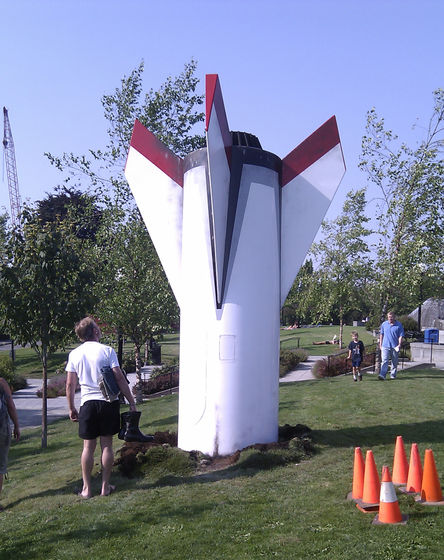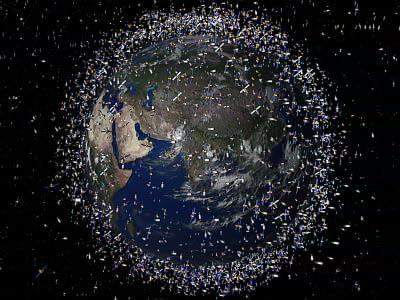How likely is it that a person will die from the fall of an 'uncontrollable rocket'?

by
On July 31, 2022, more than 20 tons of Chinese rocket parts fell on Earth and many witnessed a meteor-like fireball. Also, just a few days later in Australia, fragments of SpaceX's spacecraft 'Crew-1' were found stuck in the ground, and the danger of artificial objects falling from space with the progress of space development is a hot topic. It's also getting more and more. Research results that make us think again about the risk of human sacrifice due to such falling objects were published in the scientific journal Nature Astronomy.
Unnecessary risks created by uncontrolled rocket reentries | Nature Astronomy
https://doi.org/10.1038/s41550-022-01718-8
Scientists calculate the risk of someone being killed by space junk
https://theconversation.com/scientists-calculate-the-risk-of-someone-being-killed-by-space-junk-186666
According to Monica Grady, who teaches space and planetary sciences at the Open University in the UK, tiny objects rain down on Earth every day, weighing up to 40,000 tons each year. About. Also, once every 100 years, a celestial body several dozen meters in size breaks through the atmosphere and hits the ground, creating a huge crater.
In recent years, artificial space debris such as the booster part of the rocket that launched the artificial satellite has become a new risk in place of such natural space debris.
In a paper published in Nature Astronomy on July 11, 2022, a research team from the University of British Columbia and the University of Victoria in Canada investigated the behavior and trajectory of rocket parts in outer space and the population density at the point where they fall. We also modeled 30 years of satellite data to predict where artificial space debris will fall to Earth and the damage caused by it.
As a result, the probability of artificial space debris falling at latitudes such as Jakarta in Indonesia, Dhaka in Bangladesh, and Lagos in Nigeria is three times higher than at latitudes such as New York in the United States, Beijing in China, and Moscow in Russia. turned out to be From this, the research team points out that ``the risk of the launched rocket falling is biased not in the rocket launching country but in the global South , that is, developing countries near the equator.''

by rik rose
The research team also calculated the `` casualty forecast '', which is the risk that a rocket re-entering the atmosphere in an uncontrolled state will damage human life in 10 years. As a result, assuming that one fall scatters deadly debris over an area of 10 square meters, the result is that ``the probability of one or more casualties occurring in the next 10 years is 10%.'' I was. Grady describes this number as 'small but significant.'
As with natural space debris, most satellite and rocket debris will burn up on re-entry even if they fall to Earth, so the risk of man-made space debris falling has been thought to be negligible. For this reason, previous research on space debris has focused mainly on the risk of non-functioning satellites damaging still-functioning satellites, in other words collisions between spacecraft.
However, as the rocket launch business grows, accidents between space and ground, such as China's Long March 5B rocket, also increase. Therefore, researchers position that '10% is a very conservative estimate.'
In response to this increased risk, there are reusable rockets being promoted by SpaceX led by Elon Musk and Blue Origin led by Jeff Bezos, and a four-armed space debris capture robot being planned by the European Space Agency. ideas are being considered.
Space is becoming filled with debris.
—ESA Operations (@esaoperations) December 1, 2020
Luisa Innocenti, Head of ESA's Clean Space Office explains the world-first mission to remove debris from orbit, Clearspace-1. #SpaceDebris #SpaceCare pic.twitter.com/atlANlcf7i
There are also international frameworks to control space debris, such as the United Nations Space Debris Mitigation Guidelines . However, the guidelines are just guidelines, so there are no penalties. There are precedents such as the Montreal Protocol, in which effective legislation was developed in various countries with the goal of protecting the ozone layer as a common global goal. The reality is that the discussion does not progress until it is released.
Regarding falling objects such as rockets, which are becoming more and more dangerous in the future, especially for people in developing countries, Mr. Grady said, ``In 2027, it will be the 70th anniversary of the launch of the first artificial satellite . It would be a great congratulations if, in the anniversary year, we were able to strengthen the international treaty on space debris and ratify it by all United Nations member states, and eventually all nations would join us from such a treaty. We will be able to make a profit,' he said.
Related Posts:
in Vehicle, Posted by log1l_ks







